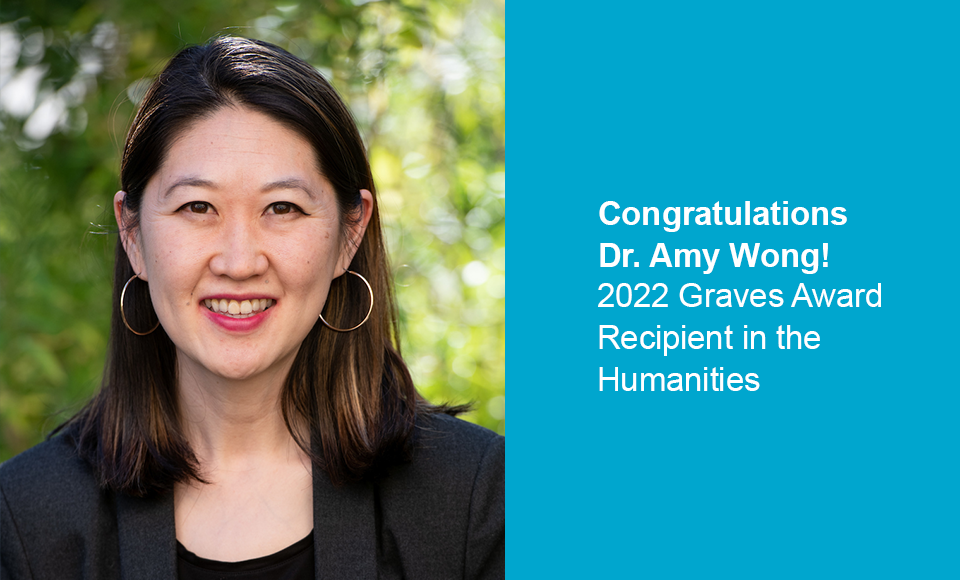Breadcrumbs
- News
- News Archive
- English Professor Awarded 2022 Graves Award In Humanities

Dominican University of California Associate Professor of English Dr. Amy R. Wong has been awarded a 2022 Graves Award in the Humanities. The award will support Dr. Wong’s sabbatical work on her upcoming book, Refiguring Speech: Fictions of Empire and the Poetics of Talk.
Administered through Pomona College, the Graves Award recognizes young faculty in the first decade of their careers to “encourage and reward outstanding accomplishment in actual teaching in the humanities.”
Dr. Wong is a scholar of Victorian studies and an associate professor in Dominican’s English Literature program in the School of Liberal Arts and Education. Her primary areas of research and expertise include Victorian literature and culture, media theory, critical race studies, and anticolonial approaches to literary studies.
As Dr. Wong notes in her Graves Award proposal, Refiguring Speech “is a book that argues that everyday talk’s seemingly mundane realities can challenge hegemonic and ultimately colonialist ideas about speech as the property of individuals.”
“When we talk with one another in the classroom, interlocutors co-own speech, and mediations of speech through gestures, tone, affect, accents enacted by different bodies in the same space compel interactions among people that might be unruly, conflictual, harmonious, humbling, embarrassing, joyful, or difficult,” she says. “These are the encounters and the emotions, I argue, that will preserve and enact democracy, rather than all of us clamoring to speak before or on behalf of others.”
Dr. Wong examines Victorian works by Robert Louis Stevenson, Bram Stoker, George Meredith, Joseph Conrad, and Ford Madox Ford to trace how forms of talk unravel “speech’s proprietary logic: both the notion that speech belongs to individuals, and affective ideals that make up the notion of “self-possession.”
“I look at how Victorian tropes on talk as `degraded speech’ circulate in our own political landscape: Brown (colonized) subjects parrot; Blackness is inarticulate or mute; Orientals (and terrorists, and women) chatter too much, and in too many languages.”
“Even as our continued debates on free speech insist on adjudicating content, our attitudes encode something different: almost viscerally, we demarcate which bodies are incapable of controlling speech, and incapable of self-possession.”
This research, Wong notes, is particularly timely as social media platforms fuel U.S. political polarization and the proliferation of disinformation challenge our longstanding notions of free speech.
“Especially amid an ongoing sense of crisis stemming from the role of social media in spreading untruths and stoking the fires of polarizing identifications, I feel the need to more precisely theorize what it is that we might be fighting against, even undoing, in the humble spaces of our classrooms,” Dr. Wong says.
“In being able to trace, for instance, a direct historical inheritance from John Stuart Mill’s defense of free speech as deeply entangled with colonialist and racist ideas about who can speak at all, to how we debate hate speech on social media and mainstream politics in the U.S., my goal is to develop more explicitly anti-colonial pedagogical methods, as well as anti-racist ones.”
Dr. Wong’s ideas for her sabbatical project largely owe to her experiences in the classroom and her desire to learn from her students. Indeed, Dr. Wong’s scholarship and teaching naturally inform one another. Her teaching philosophy emphasizes the classroom as a democratic space for shared growth where all are teachers and learners. Dr. Wong is committed to a pedagogy that connects the humanities to our lived experiences in the 21st century.
“I have learned to attend closely to language, power, and speech’s non-neutral embodiments,” Dr. Wong says. “The distinct privilege of always engaging diverse student populations has formed my deep intellectual and pedagogical commitment to what live, co-owned spaces of interaction can generate in the way of bettering our relations with others who may not look like us, think like us, feel like us.”
Dr. Wong began teaching at Dominican in Fall 2015. Her courses have covered such topics as 19th-century British literature, children's literature, dystopian science fiction, literary monstrosity, critical media studies, reading popular media, the study of film and drama, and expository writing through the lens of identity formation and community engagement. Outside of teaching, she serves on the Diversity Action Group and the Global Learning Committee. Before her career in academia, she was a public school teacher in Sunset Park, Brooklyn, specializing in English Language Learner (ELL) education.
Dr. Wong is a co-editor of “Undisciplining Victorian Studies” in Victorian Studies (with Ronjaunee Chatterjee and Alicia Mireles Christoff, 2020). Her other publications may be found in Mediations, Narrative, Victorian Review, Modern Philology, SEL: Studies in English Literature, Studies in the Novel, Literature Compass, ASAP Journal, Post45, The Los Angeles Review of Books, and Public Books. Dr. Wong received her PhD in English from UCLA, a MSc Education from Long Island University, and her BA in History and Literature from Harvard College.